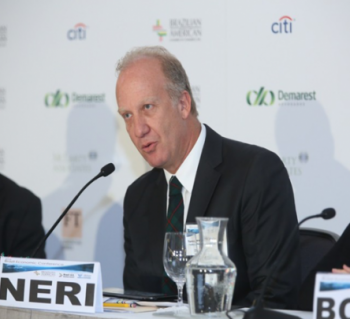Economist and director of FGV Social - Center for Social Policy, Marcelo Neri, spoke at the ‘Brazil Economic Conference’ in Washington, D.C., on October 7. The meeting was attended by the president of the Central Bank, Ilan Goldfajn, and the Minister of Finance, Henrique Meireles. Organized by the Brazilian-American Chamber of Commerce in partnership with the Wilson Center, the event stands out as one of the most important events discussing Brazil’s current economic outlook, featured in the International Monetary Fund (IMF) and World Bankannual meeting.
Neri gave the lecture ‘Prospects For The Middle Class In A Changing Environment’, mediated by Monica de Bolle, which also featured the global vice president of Walmart, Dan Bryant. The meeting brought together ambassadors, CEOs of several global companies, and public managers, among others.
Neri had already participated in a corporate social responsibility meeting with executives at the launch of ‘Perfil Social, Racial e de Gênero nas 500 Maiores Empresas do Brasil e suas Ações Afirmativas’ [Social, Racial, and Gender Profile at the 500 Largest Companies in Brazil and their Affirmative Actions], organized by Instituto Ethosin partnership with the Inter-American Development Bank (IDB). At the event, Neri led a panel with presidents and directors from the 500 largest companies in Brazil (Carrefour, Bayer, Dow Chemical Company, Walmart, Natura, among others).
Diversity is one of the areas in which FGV Social - Center for Social Policy works. Neri held the first assessment of quotas for disabled people, which resulted in a book published by FGV Social - Center for Social Policy. FGV Social - Center for Social Policy recently revealed that, between the last two censuses, the number of disabled people with work papers — “the greatest symbol of sustainable inclusion” — grew 21.1% over the overall average for the other inhabitants of Rio de Janeiro. In addition, the educational level of disabled people also grew by 10.1% over the city average, perhaps because of greater acceptance by schools.
Check out Marcelo Neri’s participation in the ‘Brazil Economic Conference’.





